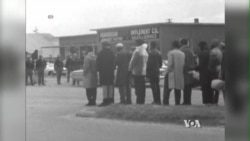U.S. President Barack Obama and former president George W. Bush participated Saturday in the 50th anniversary observance of the beating of peaceful civil rights demonstrators by police in Selma, Alabama. The incident came to be known as "Bloody Sunday." The anniversary served as an opportunity to reflect on a half-century of civil rights progress. It was also an occasion to take stock of inequality that continues to exist.
The marchers in 1965 demanded an end to discrimination against African-American voters. Scenes of police violence shocked Americans and built support for laws forbidding voter discrimination.
Obama paid tribute to the activists who helped clear the path he followed to the White House, and he acknowledged the continued existence of discrimination in the United States.
“We know the march is not yet over, the race is not yet won, and that reaching that blessed destination where we are judged by the content of our character requires admitting as much,” said Obama.
Obama pointed to a recent Justice Department report on police practices in Ferguson, Missouri, where weeks of protests followed the killing of an unarmed black teenager by a white policeman during a confrontation. The report found police in Ferguson routinely violated black citizens' rights.
Former U.S. Secretary of State Colin Powell said he was not surprised by allegations of discriminatory policing.
“I know these things have existed in other parts of our country. This should not have been that great a surprise to any of us. ”
Powell said chiefs of police across the United States should inspect their own procedures and practices to eliminate unfair treatment of minority citizens. Ferguson Mayor James Knowles says he is doing just that as he decides how to respond to the criticism of his police force.
"I think what is important now is that we go through that report, find out where the breakdown was and the patterns and practices and the safeguards that we should have had in place and need to have in place to insure that we protect the safety and civil rights of everyone who comes to Ferguson and lives in the city of Ferguson.”
In Selma, President Obama said it is a sign of progress the police discrimination in Ferguson is no longer sanctioned by law or custom as it would have been 50 years ago. He called for all U.S. citizens to work toward eliminating racial inequality.





